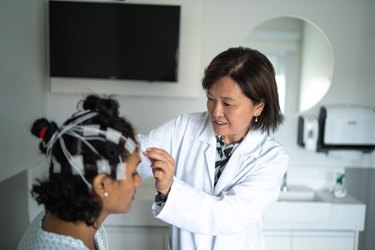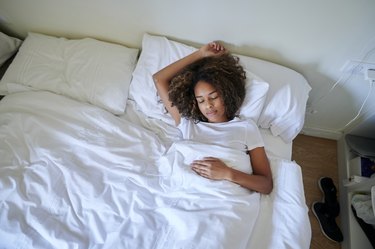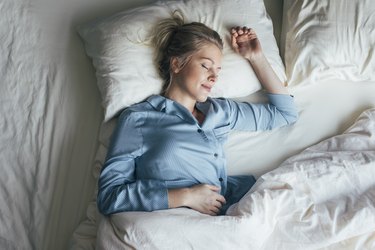
Good sleep is key to good health, which means figuring out why you're getting anything less than quality shut-eye is important, too. That's where sleep studies come in.
Also called a polysomnography, a sleep study is a painless overnight test that can help you understand why you're not sleeping well. These tests track many things, including your brain waves, breathing, heart rate and more, per the National Institutes of Health. The results can help your doctor diagnose any potential sleep disorders.
Video of the Day
Video of the Day
Consistently feeling tired during the day, snoring or waking up in the middle of the night are all potential reasons for a sleep study.
But: "Anyone who gets poor sleep may need a sleep study," says Lauri Leadley, a registered polysomnographic technologist, clinical sleep educator and the founder and president of Valley Sleep Center.
The info collected during a sleep study can help your doctor diagnose a range of common sleep conditions, including sleep apnea, restless legs syndrome (and other movement disorders), night terrors, sleepwalking and insomnia, per the Cleveland Clinic.
If your doctor recommends a sleep study, you'll likely go to a facility to be monitored throughout the night. (At-home sleep studies are available, but they may not be as accurate, per the National Council on Aging.)
With all that in mind, here's what to know before doing a sleep study, to help you prepare and get the most helpful results.
1. Be Prepared to Spend the Whole Night
If your doctor recommends an in-person sleep study, you'll spend the night at a sleep lab.
You'll usually arrive at the lab (which will likely be set up similar to a hotel room) in the evening, per Johns Hopkins Medicine. Once you're in your pajamas and ready for sleep, a technician will apply small sensors to your head and body that connect you to a computer, which will monitor your heart rate, brain waves and activity throughout the night.
These sensors are important because, "depending on the type of study, they typically record four to more than 30 various body signals throughout your sleep cycle," says Daniel Rifkin, MD, MPH, a sleep specialist and CEO of Ognomy Sleep.
The technician may also wrap an elastic belt around your middle, to measure your breathing, and place a clip on your finger or earlobe to keep tabs on your oxygen level.
If there's a chance you have obstructive sleep apnea — a condition that causes you to stop breathing during sleep — you may be asked to wear a special breathing mask for part of the night, to see if that improves your sleep.
2. Come Freshly Showered, but Skip Lotion and Hair Products
A sleep study relies on the information gathered from the sensors applied to your head and body, but some skin and hair products could mess with how well these sensors stay attached.
So, "if you're scheduled for in-lab testing, avoid using hair products like gels, hair sprays or skin lotions, as they can affect the sensors' accuracy," Dr. Rifkin says.
Basically, you'll want to arrive with fresh, clean skin and hair.
3. Bring Anything From Home That Helps You Relax
To help make your night of sleep as true to your "normal" as possible, bring things from home that help you sleep, Leadley suggests.
You can bring things like "your favorite pair of pajamas, pillows and blankets," she says.
You should also bring other items that are essential to your personal sleep routine, like night guards, glasses or contacts (for the next morning), your favorite book or relaxing music or meditations.
4. Know You Probably Won't Sleep as Well as You Do at Home
Because you'll be in a different environment and hooked up to machines, you likely won't sleep as soundly as you normally do. Doctors expect this, according to the UNC School of Medicine, and it's OK.
In fact, just a few hours of sleep is usually enough for doctors to detect certain sleep disorders.
So, less-than-restful sleep during your study most likely won't affect your results, but keep in mind that you may feel tired the next day, and adjust your schedule accordingly if you can. (You might also want to follow these tips from sleep experts on how to recover from a poor night's sleep.)
5. Avoid Caffeine Late in the Day
If you're preparing for a sleep study, it might be helpful to avoid that afternoon coffee. Caffeine is a stimulant and can cause restlessness, anxiety and a rapid heart rate — all things that can interfere with good sleep, according to the National Library of Medicine (NLM).
Even if you're used to caffeine late in the day, it's best to avoid it on the day of your study.
"The goal of the sleep study is to collect data while you sleep as naturally as possible. So, it's important to avoid things that may affect your ability to sleep, such as caffeine late in the day," says Chelsie Rohrscheib, PhD, a neuroscientist and head sleep expert at Wesper, a clinical sleep testing company.
6. Don't Take a Nap
Napping during the day can throw off your sleep for the night, per the Mayo Clinic. Even if your body is used to napping, try to stay awake throughout the day so you'll sleep better during your study.
"Avoiding napping during the day before your test will allow for as much sleep as possible during the test," Dr. Rifkin says. "If you're not sleeping, we can't measure your sleep quality," he adds.
7. Try Exercising Earlier in the Day
If you're typically an afternoon or evening exerciser, you may want to consider morning exercise the day of your sleep study.
While exercising does help us sleep better, per the National Sleep Foundation (NSF), exercising right before bed can make it hard for some people to fall asleep.
This may be because exercise raises your body temperature, makes your heart beat faster and produces feel-good endorphins — all of which give you extra energy, making it harder to settle down at night, per the NSF.
That's why Dr. Rohrscheib recommends you especially avoid exercise right before your sleep study.
8. Skip Alcohol
Many sleep experts agree you should avoid drinking alcohol the day of your study. While alcohol does relax you and make it easy to drift off, it can actually disturb your sleep throughout the night.
Most newer research is mixed on alcohol's exact effect on sleep, but one older 2014 review in the Handbook of Clinical Neurology did report that alcohol's sedative effect only lasted a few hours, leading to more fragmented sleep in the second half of the night.
9. Skip Melatonin or Other Sleep Aids
Melatonin is a hormone your body naturally makes to help you fall asleep at night, per the NLM, but it's also sold as a supplement.
In order to get a good look at how you normally sleep, it's important to avoid taking melatonin or any other sleep aid before your sleep study, Leadley says. These aids may actually be covering up the root cause of your sleep problems.
Of course, take any other necessary medication before the study — like heart or blood pressure medicines, for example, Leadley says.
Just be sure to let the sleep specialist know what medications you take and whether drowsiness or insomnia is a side effect you get from them.
10. Call Your Insurance Company
Most health insurance companies, including Medicare, will cover sleep studies if they are deemed medically necessary by a primary care doctor or other specialist. But like many other procedures, there might be some paperwork involved.
Call or chat online with your insurance company ahead of time to see how much of the sleep study they'll cover. Some may be more likely to cover at-home sleep studies, instead, which can be less expensive.
"A sleep study can be done in either a hospital or an independent facility, so costs will vary," Leadley adds.
You should also "ask if the sleep center is accredited by the American Academy of Sleep Medicine (AASM), which ensures the facility adheres to the highest standards of care for people with sleep disorders."
It's important to note that in some states, insurance will not reimburse the cost of sleep studies unless they are done in an AASM-accredited facility.
To find accredited sleep facilities in the U.S., search the AASM's sleep center directory.
11. Remember, Sleep Studies Can't Diagnose Everything
While sleep studies can give us a lot of insight, they can't answer every sleep question, Dr. Rifkin says.
In other words, there are more than 80 recognized sleep disorders, and a sleep study isn't able to diagnose every one of them.
That's why it's important to talk to your doctor and share your health history, symptoms and any other details surrounding your sleep, Dr. Rohrscheib says. Armed with that info, they may be able to diagnose a sleep issue that won't show up in a sleep study.
- National Institutes of Health: "Sleep Studies"
- National Library of Medicine: "Caffeine in the Diet"
- National Sleep Foundation: "Get Moving to Get Better Sleep"
- National Sleep Foundation: "What is REM sleep?"
- National Library of Medicine: "Melatonin"
- LinkedIn: "Lauri Leadly"
- Wesper: "Chelsie Rohrscheib, PhD"
- LinkedIn: "Daniel Rifkin, MD, MPH"
- Mayo Clinic: "Napping: Do's and don'ts for healthy adults"
- Handbook of Clinical Neurology: "Alcohol and the Sleeping Brain"
- Stanford Healthcare: "Actigraphy"
- Johns Hopkins Medicine: "What Happens in a Sleep Study?"
- UNC School of Medicine, Department of Neurology: "What to Expect at Your Sleep Study"
- Cleveland Clinic: "Sleep Study: What It Is, What to Expect, Types & Results"
- National Council on Aging: "Home Sleep Apnea Tests: Types, Costs, and Accuracy"
Is this an emergency? If you are experiencing serious medical symptoms, please see the National Library of Medicine’s list of signs you need emergency medical attention or call 911.

